Just as the new cash-strapped French socialist government announced a modest plan of aid for the country’s ailing car industry this Wednesday, a programme based on subsidizing electric and hybrid models, France’s largest car manufacturer, PSA Peugeot Citroën, announced first half losses for 2012 of 819 million euros.
Earlier this month, PSA, with declared debts of 2.5 billion euros, said it was to shed 8,000 jobs in France and will close one of its major plants, at Aulnay-sous-Bois, north of Paris, by 2014. The news caused outrage among its workforce and presented President François Hollande and Prime Minister Jean-Marc Ayrault with their first major social and industrial challenge since coming to power in May.
The total car-manufacturing sector, including manufacturers PSA and Renault and their suppliers, employs just fewer than 600,000 people in France, 100,000 of who are directly employed by PSA.
As if the government needed any reminding of trades unions’ determination to lead a long and high-profile campaign against the planned job cuts by PSA, workers from the company’s plants around France on Wednesday staged an angry protest outside its Paris headquarters, interrupting traffic around the capital’s Arc de Triomphe monument and brandishing banners that promised a “nightmare” for PSA’s CEO, Philippe Varin.
Union officials and company workers who took part in the demonstration expressed dismay at the government’s impotence in resisting the lay-offs at PSA (see page two), and there appeared to be little said at Wednesday’s presentation by industry ministers Arnaud Montebourg and Michel Sapin to change their views.

Enlargement : Illustration 1
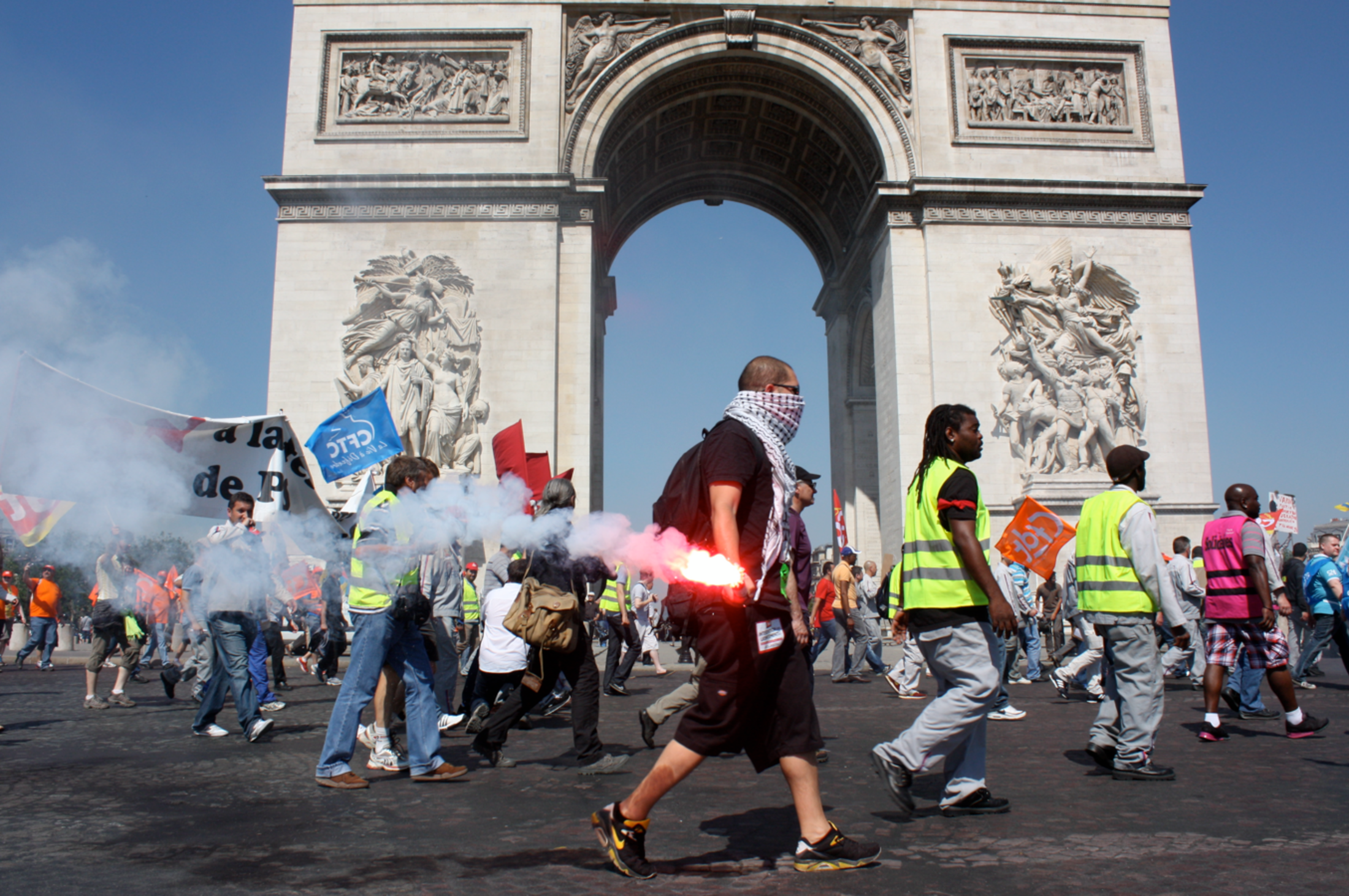
Montebourg, whose ambiguous title is Minister for Productive Recovery, which refers to the government’s attempts to revive France’s manufacturing activity, claimed that the government plan of aid for the car industry was the beginning of a “new industrial strategy”, based on the model of a “clean” and cheap vehicle which heralds “a project of progressive change in relations with the car” and which will make the “energetic transition an industrial opportunity”.
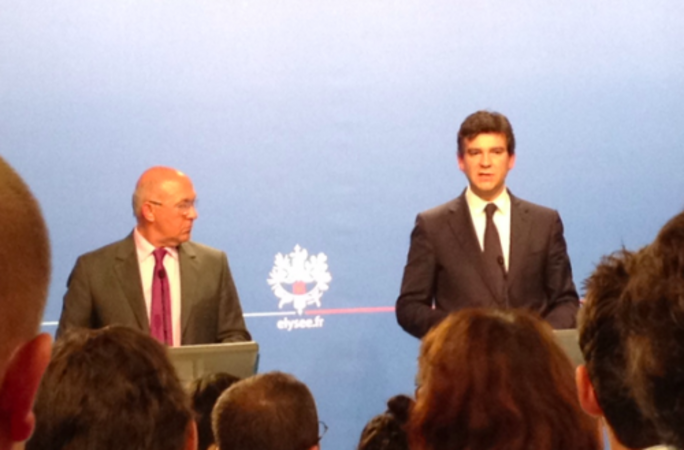
The plan revolves around an increase in subsidies, to be introduced immediately, for both buyers of new electric cars, to 7,000 euros per vehicle, and for those of hybrid models – to be fixed at 4,000 euros per vehicle. The clear aim was to spur sales of small models made by Renault – with its all-electric Zoé due later this year – and PSA’s developing hybrid range.
The cost of these subsidies, estimated at 490 million euros, is to be offset by increased taxes on vehicles with high pollution emissions, to be introduced within several months.
The government is to plough 50 million euros into the development of electric re-charging stations in cities around the country, beginning with a 12-city pilot scheme in Bordeaux, Grenoble, Rennes, Paris, Angoulême, Orléans, Strasbourg, Nice, Le Havre, Aix-en-Provence, Rouen, Nancy.
The government also committed itself to buying 11,000 electric vehicles (25% of its total fleet) from French manufacturers, and to increase loan facilities to car industry sub-contractors.
In return, it has demanded a commitment from manufacturers to keep their state-assisted R&D centres in France, along with the production of electric and hybrid models, and to maintain existing manufacturing sites.
Montebourg, who called for a “societal mobilization”, said the government wanted to make “clean vehicles accessible to every budget”, announcing the subsidized starting price for Renault’s future city compact, the Zoé, at 13,400 euros.
Montebourg, who called for a change in EU trade agreements that had notably seen South Korean manufacturers increase market shares in France, also announced that a series of ads appealing to car buyers to favour vehicles made in France would be produced by film directors Cédric Klapisch and Luc Besson. He gave no indication as to whether the pair, who he described as "militants", would be paid for their patriotic efforts.
But despite the upbeat presentation – Prime Minister Ayrault said his government had decided to "go on the offensive" with the plan he described as “highly ambitious” – it was widely viewed by commentators as a pale effort to revive a steadily flagging industry. Ferdinand Dudenhoeffer, a car industry expert with the university of Duisburg-Essen in Germany, told AFP news agency that the new plan was like "trying to put out an immense fire with a glass of water."
'Sickening, indecent, scandalous'
Although they will soon begin their summer holidays, with the traditional August shutdown across the French motor industry, the mood was grim among the demonstrators marching Wednesday under a baking sun from the Arc de Triomphe, at the top of the avenue des Champs-Elysées, down the avenue de la Grande Armée to the headquarters of PSA Peugeot Citroën.
Loudspeakers played ACDC’s ‘Highway to hell’ as the marchers, PSA workers from different factories around France, vented their anger and frustration at the company’s plan to shed 8,000 jobs in France and to close its plant at Aulnay-sous-Bois, just north of Paris, within two years.
“My moral is sapped, I’m thinking about the return from holidays, the closure, at what will be left for us to do,” commented Kouider (last name withheld), a manual worker from the Aulnay plant who joined the protestors (1,300, according to the police, 2,000 according to the union officials who organized the march).
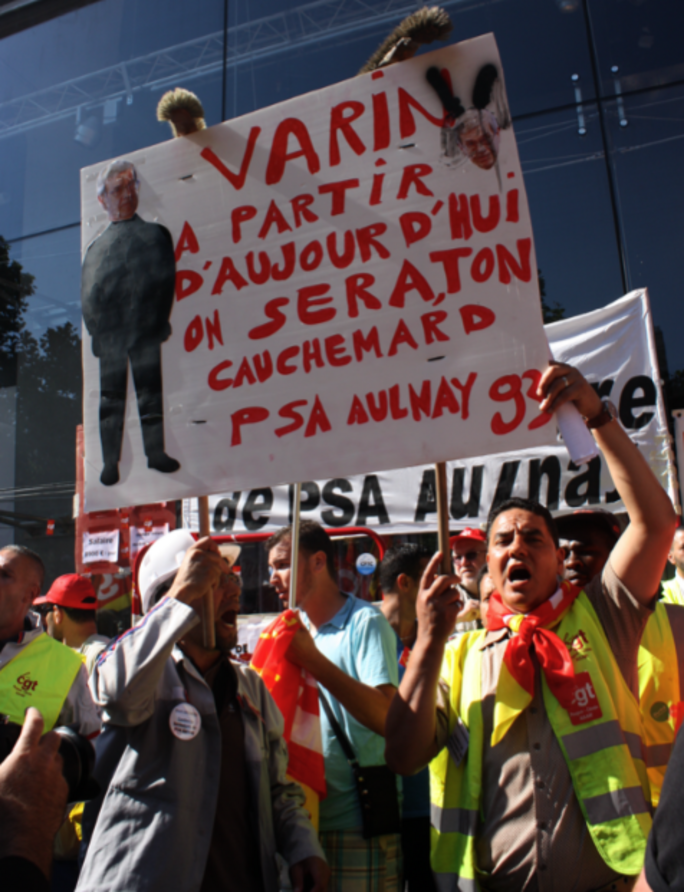
Enlargement : Illustration 3

They came carrying torches of flares and holding banners that targeted the troubled carmaker’s CEO, Philippe Varin, who finally announced the re-structuring plan after months of rumours and denials.
“We are completely washed out,” said Jean-Pierre Mercier, a representative of the CGT, France’s largest cross-trades union. “And on top of that, it’s the Ramadan. For a majority of the workforce, this is a physically tough period. Despite that, we are all mobilized […] Varin has declared war on his employees by wanting to begin immediately, just before the holidays, the infernal machine of lay-offs. We’ve managed to gain a bit of time.”
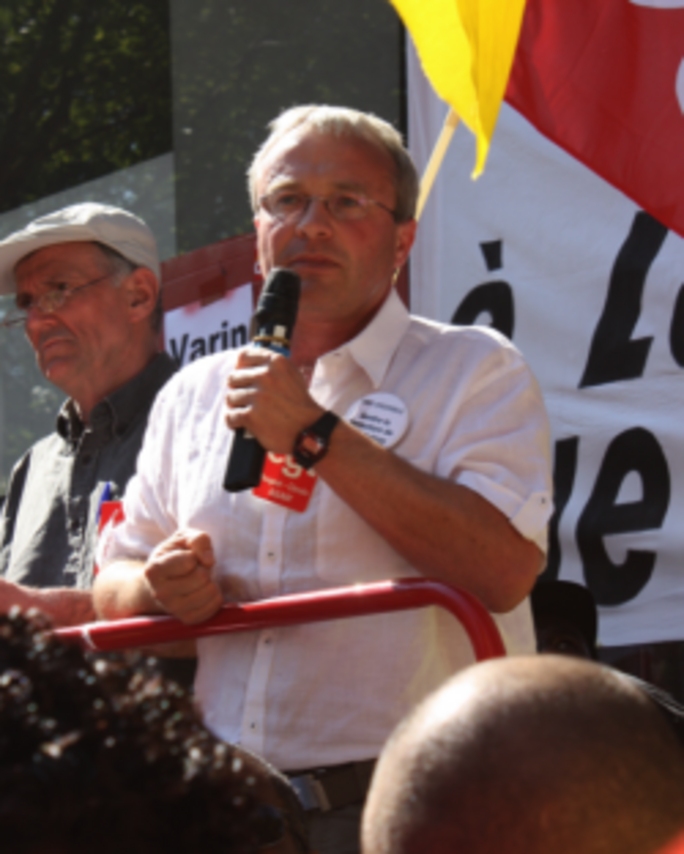
Mercier was referring to the unions’ decision to not take part in negotiations over the conditions of the lay-offs within the company’s works council, which has the effect of delaying their implementation. Meanwhile, they have commissioned a report from an independent audit company, Secafi, to assess the economic and financial situation at PSA. “We need a different assessment than that of the management,” commented another union official, Serge Maffi, of the GSEA union, the largest within the PSA group. “We cannot place credit in the management’s claims without more information.”
“We don’t want to negotiate with a guillotine blade above our heads,” added Mercier.”Our aim now is for the expert to report on his findings at the latest moment possible, so that we’ve time top organize ourselves, forcing Peugeot to back down and getting the government involved.”
Indeed, the intervention of the government – or rather, its relative non-intervention - was the subject of many of the speeches made by union officials, one after the other, standing on a makeshift platform at the PSA HQ entrance. Minister Arnaud de Montbourg came under attack for “doing nothing to help”. Among the protestors’ chants of ‘PSA, assassin!” and “Varin, resign”, there was also an ironic “Is change really for now?”, mocking President François Hollande’s recent election campaign slogan ‘Change is now’.
“Just now, we haven’t felt the political will to take on Peugeot,” said Mercier. “That Hollande says the [Peugeot] family [1] have lied is a good thing, but it’s not sufficient. For us, it’s our jobs that are at stake. When you see the millions [of euros] that the government today puts on the table to supposedly save the car industry’s bosses, you tell yourself it is completely out of touch with reality. What they are doing is sickening and indecent. Yet more public money without the least compenstaion in return. It’s scandalous.”
-------------------------
1: PSA is controlled by Peugeot family members through a 25.2% stake commanding 37.9% of voting rights.
Re-training for what?
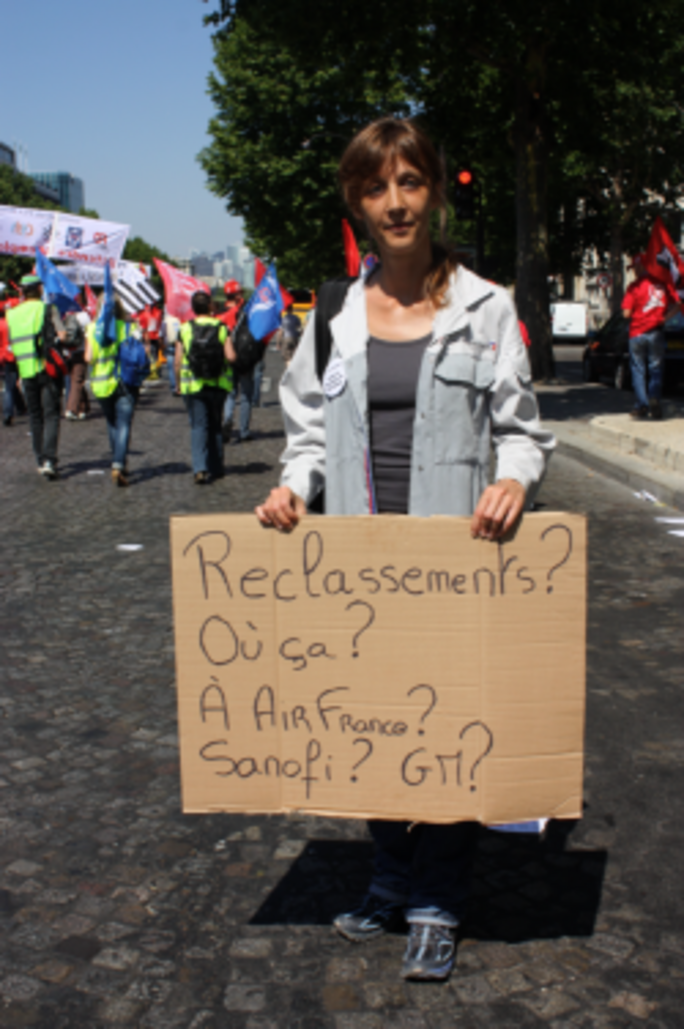
A management controller with PSA’s assembly plant at Saint-Ouen, a north-west Paris suburb, where the company plans a 10% reduction of the 700-strong workforce, Corinne (last name withheld) is highly sceptical of the government’s will to oppose the massive lay-off programme. “It’s all very simple,” she says, “since the meeting between Vartin and the prime minister there has been a clear change in tone. They say there will be re-training, but that’s worthless. Re-training to go where? To Air France, where they’re also laying off? The 8,000 people who will be thrown out will be on the dole, and that’s all there is to it.”
A small group of union officials from the Air France group, as well as the pharmaceutical firm Sanofi and the French Post Office, had also joined the demonstration. “When we hear about their boss, we get the impression we’re hearing about ours,” said one of them.
One man, dressed in his PSA working jacket, added a touch of humour with his cardboard banner in search of a former minister under the conservative government of President Nicolas Sarkozy, defeated by Hollande in May elections.
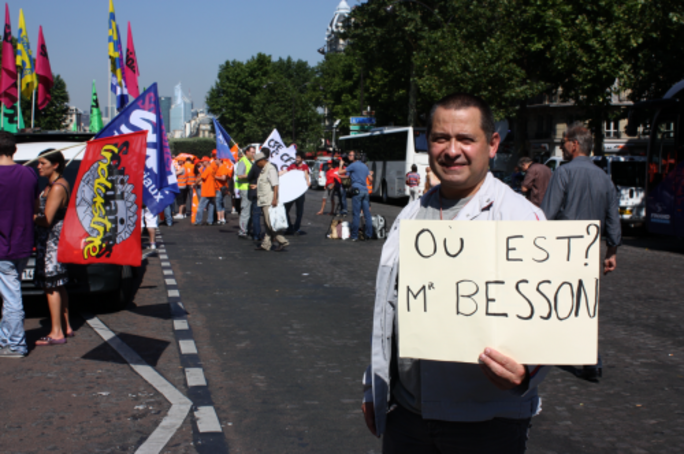
“I'm looking for the former industry minister, Monsieur Besson, him and all his friends who allowed things to carry on any old how for years,” explained Laurent Goy, employed for the past 22 years as a manual worker at the now-doomed PSA Aulnay plant. “I thought I’d find him here, but he’s apparently gone off to Morocco.”
“This battle concerns everyone,” said Goy, who has no union affiliation. “Like the others, I’ll be on holiday in a few days, I’ll try and forget all this, but that won’t be easy.”
Meanwhile, speaking on Wednesday, the Minister of Labour, Employment, Professional Training and Social Dialogue, Michel Sapin, defended the government's position regarding the job cuts at PSA. “The government is present, but [it] counts on [a process of] social democracy,” said Sapin. “By expressing this, we have opened a space for discussion, and we hope henceforth for a profound modification in the lay-off plan.”
“But it is not for the government to make things happen, that is for social dialogue,’ he added. “We are accompanying the negotiations, to help them, and to ensure that none of the parties are wronged.”
-------------------------
English version: Graham Tearse


